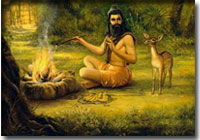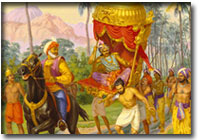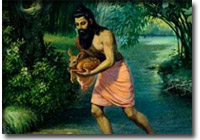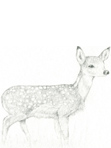KING BHARATA
|
Bharata was a legendary emperor of India, and is referred to in Hindu and Jain theology. He was the son of King Dushyanta of Hastinapura and Queen Śakuntalā and thus a descendant of the Lunar Dynasty of the Kshatriya Varna. Bharata had conquered all of Greater India.
|

It was the custom in ancient India that when a man got his daughters married and his sons well established in life, he would retire to the forest to spend the rest of his life in prayer and meditation. This was the duty of every man, whether he was a priest, king, merchant or laborer. Bharatha was a mighty monarch of his time. So when he had done his duty for his people, his children and his country, he left his palace, gave up his wealth and power and withdrew into the forest. One morning the people in the palace woke up to find that the king was not there. This meant that he had donned the robes of a mendicant, Bharatha's son was placed on the throne and life went on as normal. King Bharatha went to the banks of the river Gandaki. He built himself a small hut of reeds thatched with leaves. He chose for his meditation the most sacred Gayathri Mantra. Like this passed many days, months and years. And Bharatha enjoyed perfect peace and tranquility within his heart. One day early morning, the sun was slowly rising over the horizon. Bharatha had just bathed in the water. He had offered the last oblations to the rising sun, and clad in deer skin, he was preparing for meditation. A doe which had strayed from a deer, felt thirsty and came to the river to quench its thirst. Just then, in a nearby jungle, a lion roared. The mother deer was with the young one. The lion's roar frightened her. She delivered a baby fawn in the river. Somehow she managed to get back to the bank, where due to extreme shock and exertion she died almost immediately. The baby fawn with no one else to care for it, was being slowly swept down by the river current. Bharatha had watched this small drama from the hermitage. Now, seeing the urgency of the situation, he rose at once from the seat of meditation and jumped into the river to rescue the little animal. The poor thing was cold and frightened. Gently, he carried it in his arms back to the hermitage. There he lit a fire and warmed it back to life.
This was a beautiful act, was it not? But alas! It proved to be the spiritual downfall of Bharatha. He now became very fond of his deer child. He looked after it with paternal care, fed it soft green grass and juicy fruits till it grew up to a beautiful deer. Now it so happened that instead of turning more towards god, his mind turned more and more towards his deer. In the evening, when he should have been meditating upon the Lord, he would anxiously be waiting for the deer to come back from its romping in the forest. He would sit at the door of his hermitage, in deep concern, and wonder, "O why has my little one not come yet? Is it in trouble? Has a tiger attacked it and eaten it up?" Thus passed some years. The noble king who had given up wealth and power, nay, the rule of an entire country; who had made his mind pure and free form attachments, had now become so attached to a little deer rescued from a running stream, that he had completely stopped his devotional practices! The more fonder he grew of the deer, the less did he think of God. The time came for Bharatha to die. As he lay then, waiting for death, the deer stood by his side like a faithful son, shedding tears of sorrow. Bharatha was touched by this,that his last thought, instead of being God, was of the deer.

Now we have always been told that a man's last thought determines his future life. So Bharatha was born again as a deer. But he was born with a memory of his past life, because no devotion or prayers can ever go waste. But being in animal body, he could not speak. He left his deer family in the hills and came to the Pulaha ashrama on the banks of the river Gandaki. Here he would listen to the talks of the rishis , hear the readings of the Upanishads and eat the remains of the offerings. And he would patiently wait for the time when he could give up his deer body because it made meditation impossible for him. After his deer birth, Bharatha was reborn as the youngest son in the family of a wealthy Brahmin. This Brahmin was a very good man. Bharatha had not forgotten the experiences of his two previous births. He still remembered the pains and pangs caused by attachment. So in this life he would not even talk. He shunned sanga of any kind. People soon took him to be a mad man. His father and mother, however, treated him like a normal child. But soon enough, they died and left him to the care of his elder brothers and their wives.
The brothers, sad to say, did not take very good care of him. They made him do all the heavy work and their wives too, treated him very unkindly. They would not even give him enough food or clothing. But Bharatha uttered not a word in protest or anger. He would obey them and with perfect peace and quite of mind he would do the work allotted to him- whether it was fetching and carrying, or ploughing the fields. Sometimes, when they lost their temper with him, he would go and sit under a tree till their anger had cooled off. Then he would go back to the house. A robber chief once wanted to offer a sacrifice to the goddess Bhadrakali, as he wanted to be blessed with a son. But it so happened the victim whom they had got untied himself ran away. The band of robbers looked high and low for him but all in vain. After much searching, they came across the insane looking Bharatha sitting under a tree, watching and keeping guard over a field. They caught him and took him to their chief, who was pleased to see such a strong looking man as a victim for the sacrifice. The robbers then bathed Bharatha in fragrant waters, gave him new clothes, gold ornaments, sandalwood paste, flower garlands and fed him a good meal. Then they took him and tied him to a post.

The fires were lit and as the mantras were being chanted, the chieftain drew out his sword and raised it to cut off Bharatha's head, Bhadrakali the goddess, could bear this no longer. In her fury she emerged out of her statue and snatched away the weapon from the hand of the chief and set Bharatha free. One day, it so happened that the palanquin of King Rahugana was passing by. One of the bearers of the palanquin suddenly fainted and Bharatha who was sittng quietly under a tree, was forced to take his place. He took the pole of the palanquin and placed it on his shoulder, but his step was unsteady. For his heart was full of mercy and he walked slowly, lest he should tred upon an ant or a beetle. Now it must have been terribly uncomfortable to be carried in a jolting palanquin. King Rahugana looked out and saw that his new bearer, although strong and sturdy was constantly hopping and jerking. So he called out and said, "Fool. Put down the pole and rest awhile if you are tired. Yes, rest if you are tired, though you look to me as strong as two oxen put together."
Bharatha then lay down the pole. He smiled, and , for the first time in his life he opened his lips to speak. "O King," he said. "Whom do you call fool? Whom do you call strong? If it this body you are addressing, then it is made of the same flesh and blood as yours. I am no mad man, King. My mind is steadily fixed upon the Lord. But this body did not want to trample poor and innocent calling worms, therefore it went slow. The true self never wearies, for it has nothing to do with the body. It knows no command because it is neither master nor slave. It is the same self everywhere in the universe. Then who should command and who should obey? Realize this great truth, O King,that you too may come to know this self." King Rahugana was astonished to hear Bharatha's words of wisdom. He got down from his Palanquin and prostrated before him "Full length". "Pardon me for insulting you, O holy sage," he said. "For I did not know your greatness. I wish to learn more about this from you. Please teach me, for I now consider myself as your disciple ." "Now King, cut your bonds of attachment. Embrace the world in your love for him. You shall reach him, who dwells in the heart of all." This holy land of ours has always been the land of sages and men of wisdom. For it is only here that the supreme ideals of love, service, worship and meditation are taught as the means of self realization. We are taught to love and serve him, not for any material gains or benefits, but for the sake of love and service themselves. In this story we see how mighty kings gave their throne and power because of their love for truth. They renounced all, that they may be one with God.





